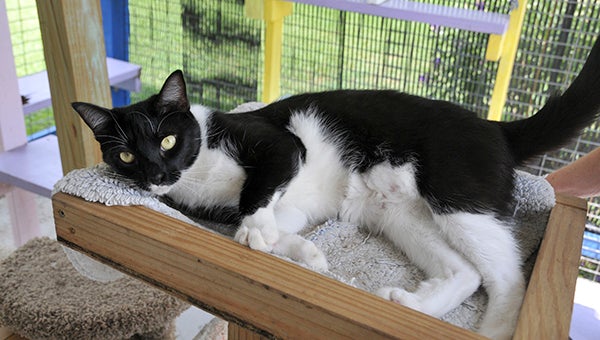Rabid kitten marks first time in 50 years rabies found in land animal
Published 7:00 am Saturday, August 22, 2015

LOOKING FOR FOREVER HOME: Little Orphan Annie is 16-months-old and is looking for a permanent home. She is up to date on her current vaccinations, PRCSPCA President Maria Diamond. Little Orphan Annie is playful, friendly and gets along with other cats, Diamond said. However, she is not much of a lap cat. She is available for adoption at the PRCSPCA Shelter in Picayune.
Photo by Cassandra Favre
Wednesday, the Mississippi State Department of Health confirmed the first rabies case in a land animal in Mississippi in more than 50 years.
According to a MSDH release, rabies was identified in a feral small, black and white kitten in Starkville.
The MSDH defines rabies as “a viral infection of the nervous system and brain that is usually fatal once symptoms appear. Rabies is usually spread to humans from the bite of an infected animal.”
Exposure to the cat was reported in downtown Starkville near portions of the Thad Cochran Research Park near Mississippi State University’s campus, the release states.
The cat’s brain tissue was tested at the Mississippi Pubic Health Laboratory, which confirmed the rabies diagnosis, the release states.
Through further testing of the cat’s brain tissue, it was confirmed the cat was infected with rabies from a bat, the release states.
“We regularly identify bats with rabies in Mississippi, so these results tell us that the cat became infected after contact with an infected bat rather than contact with another animal,” Deputy State Epidemiologist Dr. Paul Byers said in the release. “However, this serves as a reminder to never touch or handle bats, and if you do have exposure to a bat, contact your local health provider and your provider can contact the Mississippi State Department of Health for consultation.”
The MSDH recommends taking the following precautions against rabies:
–– Do not handle or touch live or dead feral animals.
–– People should contact local animal control officials if they see a dog or cat acting strangely.
–– Vaccinate animals after they have reached 3 months of age.
–– A bat that is active in the daytime and is unable to fly and easily approached, it could have rabies and should be avoided.
–– Wash an animal’s wounds thoroughly with soap and water and seek medical attention immediately.
According to Mississippi law, cats and dogs must have their rabies vaccination administered after 3 months, PRCSPCA Shelter Director Judy Wheaton said.
There are two types of rabies vaccinations that include a one-year vaccine and a three-year, she said.
“As I’ve been told by veterinarians, the first time a pet owner gets a three-year vaccine, they must get one the following year, before they can wait the full three years,” Wheaton said. “In Pearl River County, there’s a $250 fine if pet owners cannot demonstrate proof of rabies vaccine.”
When an owner reclaims their animal from the shelter and can’t produce rabies vaccine documentation, the shelter collects the money and provides them with a receipt to take to a veterinarian, she said.
Rabies is akin to most human diseases that are vaccinated against, Wheaton said.
“Unless the disease is totally eradicated, then we are still susceptible,” she said. “Many neighboring states have had problems with rabies in their wildlife.”
All animals adopted or transferred out of the shelter receive their rabies vaccination, Wheaton said.
Twice a year, the PRCSPCA host a rabies, microchip and wellness shot clinic, Wheaton said. They are usually held after Picayune’s street fair events and the cost for a rabies vaccination is $7.
“It’s unfortunate this happened, but hopefully people will get their animals vaccinated against rabies,” Wheaton said.
The PRCSPCA is located at 1700 Palestine Rd. and is open Tuesday through Saturday from 10 a.m. to 4 p.m. Contact staff by phone at 601-798-8000.
For more information, visit www.prcspca.org and through Facebook at Pearl River County SPCA.
For more information about rabies, visit the MSDH website at www.healthyms.com/rabies.




